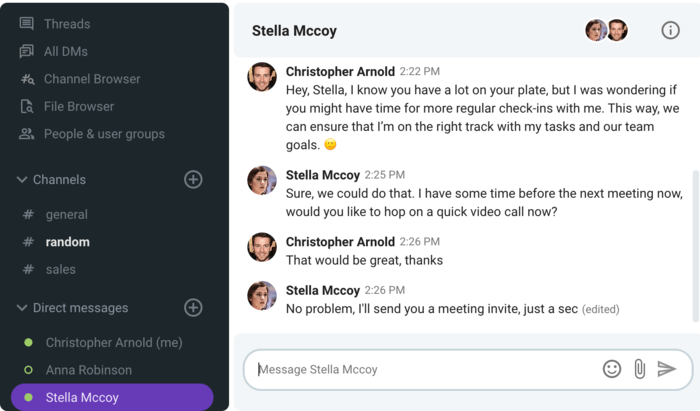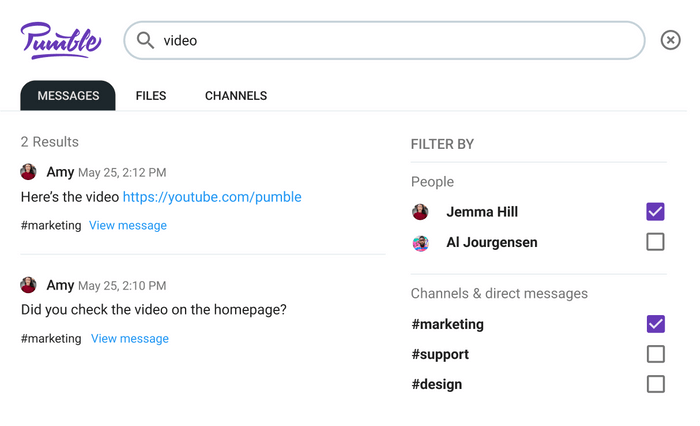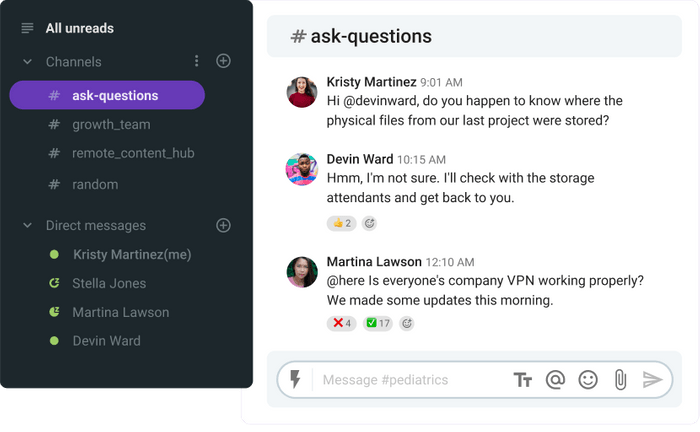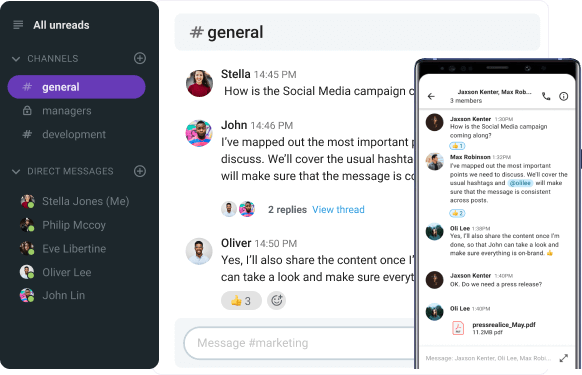Let’s be honest: asking questions at work can be really uncomfortable. We don’t want to be seen as incompetent, inattentive, or even too eager. Some of us would rather avoid having to ask these questions, period.
However, you can rarely have a productive day at work without at least a few questions directed at your coworkers and supervisors. So, whether we like it or not, this is a skill we can all polish.
The negative outlook on question-asking is mainly a product of outdated and unfounded beliefs, and it can be changed with a simple shift of perspective. If we choose to, we can frame this practice with its benefits in mind, allowing us to ask better questions at work and gain more value from asking them. This article shows you how. First, we explain the common types of questions at work and the benefits of asking better questions. We then provide tips and exercises to help you master this skill.

Table of Contents
What are “better questions” at work? (a.k.a the common types of questions at work)
First of all, what are “better questions” at work? Well, one of the answers to this question would be the following — Asking “better questions” at the workplace involves asking the right questions at the right time, with the right intention. To help further clarify this, let’s look at the common types of questions you may ask at work, classified by their intention — what the asker is trying to achieve by asking them.
According to research, questions can be categorized as:
- Information-seeking questions. People use these questions to ask others for information they don’t know.
- Example: “When do we start the new phase of our project?”
- Rhetorical questions. The asker already knows the answer to the question, but uses it to emphasise a point.
- Example: “You know that work hours start at 9 a.m. sharp?”
- Examination questions. These are questions that people use to test someone’s knowledge.
- Example: “Do you know what the first rule of this office is?”
- Indirect requests. These are polite requests for action, including suggestions and invitations.
- Example: “Can you help me with this printer, please?”
“Better” questions are those that, depending on the context, effectively accomplish one or more of these intended purposes in a manner that is timely and situation-appropriate.
Now that we know what types of questions we’ll be talking about, we can take a look at some of the benefits asking them provides.

What are the benefits of asking better questions at work? 👌
Notable benefits you get from asking better questions at work include an improvement in active learning and deeper connections formed with your coworkers. Additionally, an open attitude towards asking questions makes you seem more likable, as well as more passionate about your work.
Good questions boost active learning
Asking good questions shows the beliefs and premises of the person being questioned. This allows them to reflect on their thought processes, and actively learn from the experience. So, when you ask someone a thought-provoking question, not only do you learn valuable information from the interaction, you also give the other person an opportunity to learn something themselves.
You seem more likeable
If this wasn’t enough to convince you, one Harvard study showed — in no unclear terms — that people who engage in question-asking are more universally liked. Perceived as more understanding and responsive, these people have better odds at leaving a positive impression on their conversation partners.
Others can see you are passionate about your work
When you ask thoughtful questions, it shows you care about your work. It demonstrates initiative and having a proactive attitude, allowing others to see the level of enthusiasm you have for your role in the organization.
Asking questions creates connections
If you ask someone a question that lets them open up and speak frankly about something they care about, you create a deeper connection between the two of you. This connection is based on trust, mutual respect, and understanding. As such, it provides people with enough room to express themselves truthfully. These connections can often carry over into other areas of business, and even personal life.
9 tips to help you ask better questions at work 💯
We’ve established the benefits of asking better questions at work, so now it’s time to take a look at some tips on how to go about it. With enough thought and practice put into learning this skill, you can ask great questions that help you advance your career and work relationships.
1. Before you ask, find out if the question hasn’t already been answered
You don’t want to look uninformed, so pay attention to all available information the company has provided around the topic you have questions about. You may want to check out any guidelines, company wikis or even chat logs, as potential locations of needed information. This can prevent frustration people feel from repetitive questions being asked, and written instructions are often more comprehensive than verbal ones.
🔶 Example:
Danny is newly hired as a video editor for a web-based journalism company. She wants to know about the procedures when it comes to posting videos on social media, so she first checks the company wiki to find out information about it. When she finds no relevant instructions, she takes a look at the chat log of her team’s messaging app, and is soon rewarded with the exact information she wanted to know.
💡 In order to be able to find whether your questions already have an answer, you’ll need free access to your messaging history. Pumble is a business messaging app which offers many free features, including unlimited chat history for free.

2. Conquer your fear of asking questions
The thought alone of having to ask questions at work is enough to make some people nervous and jittery. Understandably so, as asking questions usually means that you don’t know the answer — automatically putting you in a vulnerable position.
However, it is crucial to overcome this fear, as it prevents you from accessing all the benefits asking questions has for your career. So, we say — practice, practice, practice.
With time and repetition comes confidence, so taking the first step is the pivotal point.
🔶 Example:
Sharon is an office assistant for a mid-size company. Lately, she’s been having many additional tasks added to her workload, so she believes it’s time for her to ask for a raise. However, she’s already missed too many opportunities to raise this subject with her supervisor, due to being too anxious. She decides to pick up a book to help with her confidence, and when she finally does ask for a raise, she finds out that her supervisor is more than willing to comply with her request.
3. First ask questions to yourself
It’s good practice to first examine your own attitudes and thought patterns. This allows you to be more objective and well-reasoned when approaching your work responsibilities.
A keynote and TEDx speaker and author, Ira Wolfe, can help us with his advice on asking the best questions to ourselves.
We reached out to him for this blog post, and got the following answer:
“For certain, the best questions depend on context. But over the years I’ve always found these to be helpful:
– What am I seeing that I’m denying because it doesn’t fit into my view of the world?
– What alternative conclusions are possible?
– What unintended consequences, both positive and negative, should I consider?
– Can I afford to ignore what I see?
– Am I listening to the people closest to the problem or the opportunity?”
🔶 Example:
Caleb has had trouble with making rash decisions in the past. Upon reflection, and with his role as a general manager of his company, he found this unacceptable. So, he set up a system of written notes on his desk, reminding him to reexamine his attitude every time he is about to make a significant decision.
These notes include questions such as:
- “Have I consulted people around me before making decisions?”
- “Are there any alternative solutions to this?”
- “Am I too excited, and ignoring possible issues?”
4. Make use of technology to help facilitate question-asking
Communication technology is an integral part of the modern workplace. Use it to your advantage to facilitate question-asking among members of cross-functional teams, among peer employees, and between supervisors and those under their line of authority.
Up to 75% of millennials find phone calls too time-consuming. On the other hand, face-to-face meetings might even be impossible — when working remotely for example. But, with the productive use of communication tools, such as a business messaging app that has the right features, your team can have a simple and stress-free way of asking relevant questions when it comes to tasks. It’s an easier, simpler, more efficient, and more centralized way of communicating in the workplace.
🔶 Example:
As shown below, you can create a #ask-questions channel in your team messaging app. Kristy, Devin, and Martina use it here to all ask pertinent questions, and get instant feedback.

5. Ask authentic questions
Authentic questions come up as the result of the asker’s natural curiosity. They are not forced or instructed by their supervisors or company structures. The way they are, authentic questions show genuine interest and resonate well with the people participating in the conversation. Additionally, these types of questions can disrupt obsolete structures and patterns of organizing, allowing room for growth for both the company and the individuals.
🔶 Example:
In the middle of a long meeting around implementing new features for an e-commerce app, Matt — a junior designer — asks: “How does this feature help the user?” He is initially met with silence, as the discussion centered mostly around financial costs and benefits to the company. Then the meeting turns into a brainstorming session, with many participants suggesting the possible issues new features would solve for the user.
6. Avoid loaded and leading questions
When you ask a question with an answer in mind, you fall into the trap of asking loaded and leading questions. With how they’re phrased and voiced, these questions suggest to the respondent what is expected from their response. Your conversation partner might feel pushed into a corner, without space to freely express their opinion. In fact, these types of questions defeat the whole purpose of asking questions — learning something new and valuable.
🔶 Example:
“You weren’t going to tell me that you were taking time off next week?” Sally is the lead accountant, posing this question to Rudy — a junior accountant. Feeling put on the spot, Rudy stumbles over his words. Rudy feels the need to go into a defensive stance, even though he had every intention of telling Sally about his vacation. He resorts to what sounds like excuse-making, which makes the entire conversation even more uncomfortable for him.
7. Ask open-ended questions
If a person can answer your question with only a “yes” or a “no” — you’re not asking great questions. Always make sure your questions are open-ended, so they give space for people to provide thoughtful and relevant answers. A close-ended question limits what the respondent can say, providing no incentive for them to go into detail or to give more context about what is being said.
🔶 Example:
When writing an employee engagement survey, Kayla — an HR assistant — opts for open-ended questions which allow more freedom of expression to the employees. So, instead of asking: “Overall, are you satisfied with your job?”, she writes: “What kind of offer would make you consider leaving your job?”
8. Listen closely to the answers
People hate repetitive questions. You don’t want to be stuck in some kind of a nightmarish loop of a meeting where someone keeps asking the same thing without paying attention to the responses. If you ask the same questions over and over again, it can give people the impression that you are lazy, inattentive, or even annoying. So — listen closely! It’s been proven to positively affect all aspects of interpersonal interactions.
🔶 Example:
Sam’s inattentive attitude led to him being fired from his previous job as a customer service specialist. His inability to listen closely to the client’s request was the cause of many misunderstandings and frustrations expressed by the clients he communicated with. Finally, after many warnings, he was given his notice as the ability to listen and understand the customer’s needs is crucial for this job.
9. When people say you’ve failed, ask: ”How can I improve?”
Or, in other words — ask for negative feedback and possible solutions to your drawbacks. Re-frame your setbacks as an opportunity to learn and to change what led up to an unsuccessful outcome. This provides guidelines and makes room for you to improve in the future.
🔶 Example:
After another unsuccessful job interview, Bret decides to ask the hiring manager: “What areas do you think I should focus on improving before applying for the next job?” The manager goes on to give him a detailed explanation of his shortcomings and points him in the direction he should take in the future.
Exercises to help you ask better questions 🏋️
With some exercise, asking tactful and non-judgemental questions will become second nature to you. Remember, asking “why” may make people defensive, if they feel put on the spot. So, stick with a more neutral word choice — without compromising on the assertiveness of the question.
| Situations | ❌ Instead of saying | ✅ Practice asking |
|---|---|---|
| Asking peers | 1. When are you going to fix your part of the presentation? 2. Why weren’t you available when we agreed to go through the brief at 12? 3. I don’t get it, what do you mean by that? | 1. Can you look at some of the comments I left on your part of the presentation? 2. I have many other tasks today, can we please agree on a specific time for going through the brief? 3. Can we arrange a meeting and discuss this more thoroughly? |
| Asking supervisors | 1. I’m the perfect candidate, why didn’t you hire me? 2. When can I get a raise? 3. I’m too busy, can’t you ask someone else to do it? | 1. What areas do you think I should focus on improving? 2. What kinds of opportunities for growth does the company offer? 3. I’m afraid it would be hard to fit that into my schedule, is it a priority? |
| Asking subordinates | 1. Why did you fail to do the task? 2. Do you like your new coworker? 3. This is so simple, when are you going to learn? | 1. What did you find challenging about this task? 2. What do you find most interesting about your new coworker? 3. Is there any way I can make this topic more clear for you? |
Of course, this is not a comprehensive list, but it outlines some of the guiding principles you should stick to when asking questions in a professional environment.
To reiterate, these principles are:
- Stay neutral and non-judgemental;
- Watch how you phrase your questions;
- Whenever possible, avoid “why” questions;
- Be assertive — state your intent properly;
💡 If you need help with assertive communication, check out our article on How to be more assertive in communication when working remotely.
Summary: With practice, everyone can ask better questions at work
The key point of this article is that asking good questions at work is a skill that everyone can hone and benefit from. A proper approach to asking questions at work is formed through being non-judgemental, assertive, and understanding of everyone’s needs. Combining the exercises and tips we provided, you can become confident in your question-asking skills. This will make you a better conversation partner, more likable, more productive, and innovative in the workplace. Most of all, this will help you become a better learner, opening up possibilities for career growth in the future.




